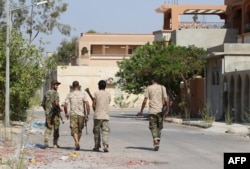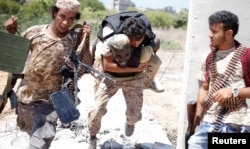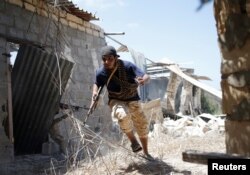Libyan Islamists opposed to the country’s struggling U.N.-backed ‘unity’ government have condemned this week’s U.S. airstrikes targeting Islamic State fighters holed up in the coastal town of Sirte.
Influential Islamists say the airstrikes that started Monday are ‘illegal’ — despite the fact they were requested by Libya’s internationally recognized prime minister, Fayez al-Sarraj.
The country’s grand mufti, Sadek Al-Ghariani, who helped fan anti-GNA (Government of National Accord) protests in Tripoli in late July after the French government acknowledged it had commandos on the ground in Libya helping to battle IS, denounced Thursday the U.S. airstrikes as unacceptable.
And on a Libyan TV station he appeared to inch close to defending IS fighters, arguing that unlike in 2011 with the West’s assistance in the ouster of strongman Moammar Gadhafi, the West’s bombing raids this time were aimed at Muslims following the Sunna (the Way) of the Prophet.
In Libya the conflict now is between local people who are all Muslims, and the West should not get involved, he said. A GNA-loyal militia, Tripoli’s RADA (Deterrence) forces, claimed Thursday in response to Al-Ghariani’s remarks that there are links between hardline Islamists and the jihadists.
Growing split
The mufti’s intervention illustrates the widening rift between an alliance of hardline Islamists loyal to a GNA rival, the Government of National Salvation, also based in Tripoli, and a tenuous coalition of militias supporting the GNA. Western diplomats have recently expressed concerns that the mufti and his allies may be close to calling for the formation of a supreme revolutionaries’ council to replace the GNA - although so far they have not opposed the unity government militarily.
The dispute between hardline Islamists in the Libyan capital and the U.N.-backed government is adding to already bitter rivalries setting Libya’s regions, towns and tribes against each other in a complicated patchwork of local divisions, and rivalries that emerged after the ouster of Gadhafi. Alliances can shift and are hard to plot as rivals recalibrate their loyalties depending on the short-term gains they calculate they can secure.
Some analysts worry that the current mainly covert military involvement of Western countries against IS in Libya is adding to the chaos in the strife-torn country because the U.S., Britain, France and Italy are assisting opposing political alliances.
“Complicating the matter is that the U.S. is backing different forces than its French and Italian allies,” according to Jason Pack of the consultancy Libya-Analysis.
In the U.S. case, the airstrikes targeting IS extremists in Sirte this week have been supporting militias mainly from the western Libyan town of Misrata currently loyal to the GNA. British commandos have also been assisting Misratan militiamen against IS.
But France and Italy, as well as Egypt, have been working with the forces of General Khalifa Haftar, the military commander of a government in the east, one of the two rival governments the GNA was meant to have replaced in December.
The eastern government based on the rump of a former parliament, the House of Representatives, has so far refused to recognize the U.N.-backed GNA.
Lack of coordination
Last month, GNA officials insisted the French had not coordinated the presence of commandos in eastern Libya with them. And, in the face of anti-Western protests fanned by the grand mufti and his allies, issued a diplomatic protest summoning the French ambassador for a meeting.
Anti-IS Western operations in Libya before the U.S. airstrikes this week had been an open secret for months and widely reported on by international and local media outlets. Misrata militiamen have described publicly the intelligence, logistical and even combat assistance they have been receiving from British special forces in skirmishes in Sirte against the jihadists.
The U.S. and British governments have provided little information publicly on the numbers and mission of any ground forces they have in Libya. In May, there were reports of British commandos thwarting an IS suicide mission near Misrata, but British Defense Secretary Michael Fallon told Britain’s lawmakers the government was not participating or even planning combat roles in Libya.
Western officials, though, say privately, the priority for them has to be the fight against IS and they need to collaborate with both the GNA and General Haftar, despite the fact they are bitter rivals.
The danger of that approach is one of lack of strategic clarity, cautions Olivier Guitta, a British geopolitical risk and security consultant, who worries the West has no long-term plan for stabilizing Libya. “The U.S. has to be careful of the unintended consequences of a new military campaign” in Libya, he says.
Guitta argues the political impasse in Libya is something IS is adept at exploiting and will feed off it even if the terror group’s fighters are finally pushed out of the center of Sirte.
Before this week’s U.S. airstrikes, American lawmakers also questioned whether there is a grand strategy in place — not only to defeat IS in Libya but to try to glue the country back together again.
On June 21 during a hearing, Senator John McCain, chairman of the Senate Armed Forces Committee, queried whether the Obama administration has “a strategy for Libya or are we just acting in an ad hoc fashion.” Pressed by McCain, Marine Lieutenant General Thomas Waldhauser, the incoming commander of U.S. forces in Africa, conceded he didn't know of one. “I am not aware of any grand strategy at this point,” he said.







